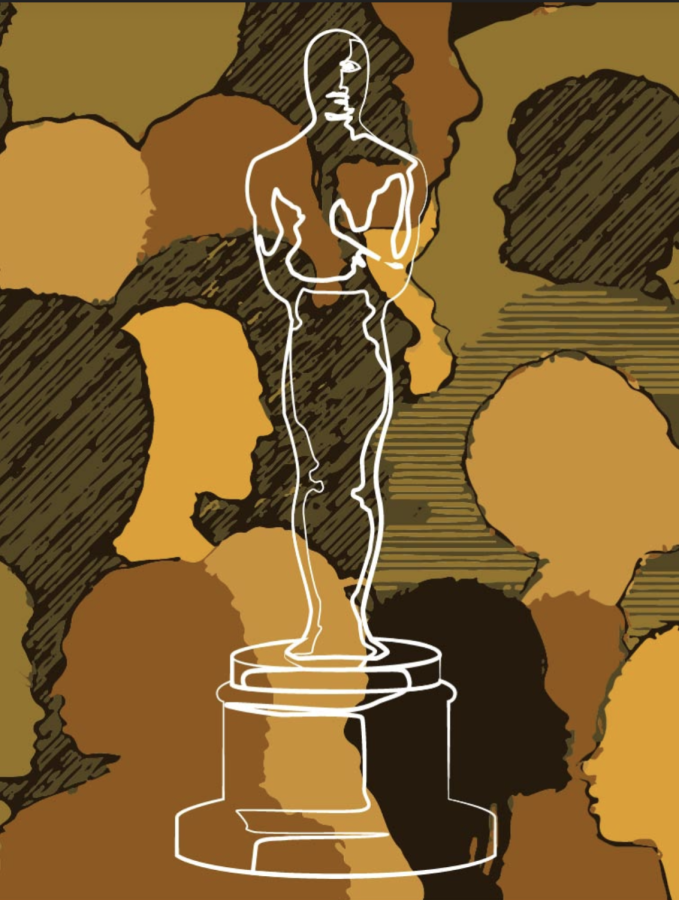#OscarsFanFavorite points to new direction for Academy Awards
This year’s Academy Awards is featuring a new category: Fan Favorite. The award brings into question the prestige of the Academy and the award ceremony itself if the general public’s opinion is now considered.
March 27, 2022
The Academy Awards, or the Oscars, has honored and celebrated brilliant films for the past 93 years. The award shows are now taking a new focus, differentiating them from other traditional award ceremonies. Film industry members of the Academy have traditionally voted among themselves to decide the winner of each award, but this year on March 27, the Academy will attempt to make the Oscars more inclusive by giving the public a voice in the awards.
A new category for the Oscars, Fan Favorite, became a trendy way to incorporate audiences’ opinions on the best movie of the year. Using the hashtag #OscarsFanFavorite, Twitter users are able to vote by sharing posts, and the film with the majority of fan votes will be crowned as the fans’ top pick of 2021. The Academy is purposely using this hashtag on a social media platform to promote the ceremony by luring a larger audience.
Naia Peterson, a first-year communications and graphic design major, said she supports the Academy’s strategy to increase viewership and ratings because it creates more opportunity for fans and filmmakers to be heard.
“The people should have some say, if it is just one category of it being ‘Fan Favorite,’ then I am here for it,” Peterson said. “It then allows for films that maybe would not previously be included to now have a chance of winning.”
Students believe this strategy will better capture the perspective of regular audiences and not only film industry veterans. The anticipation of the Fan Favorite winner announcement and feeling of inclusion by voters is motivation for many viewers, especially for those who are new to the Oscars, to tune in and stick around to watch.
“If I voted for Spider-Man, I would definitely want to watch the show to see if my vote counts. Did the movie I voted for win?” said Mackenzie Shoniker, a first-year combined criminal justice and psychology major.
#OscarsFanFavorite creates a platform for those who can only dream of being on the Oscars stage. Though many believe the show is pretentious, for young filmmakers, accepting a gold trophy on television is a coveted accomplishment. However, Janaki Mehta, a first-year politics, philosophy, and economics major, believes the category could lessen the prestige of the Academy.
“People want to feel included so the amount of people that tune in to watch might go up, but on the contrary, people may think the Oscars aren’t as good anymore and take it less seriously because anyone can vote,” Mehta said.
Previously, Academy members within a specific branch for each Oscar award voted for artists from their own category. That means costume designers vote for Best Costume Design, screenwriters vote for Best Original Screenplay and editors vote for Best Film Editing. But everyone gets to nominate the Best Picture award regardless of their field.
If filmmakers want recognition from the Fan Favorite category, they now must learn how to properly incorporate the public’s perspective alongside professional views within the industry. Students who spoke with The News said #OscarsFanFavorite could increase the show’s popularity but alter what the Academy wants to be known for.
“[There is a] level of privilege, prestige and exclusion that I don’t agree with on a moral level, but it’s how the Oscars are intended to be,” Mehta said.
While this may be the case, having a balance between what the audience wants and what esteemed filmmakers want can positively bridge the gap between blockbusters and arthouse films. However, some filmmakers fear their creativity will be limited by prioritizing the audience’s interests.
Keith Bound, founder of Receptive Cinema, wrote in an Leading Edge Only article that “having an in-depth understanding of audiences’ behavioural responses would enable filmmakers to produce engaging content more consistently than from a purely creative perspective.”
Unlike many Oscar-worthy films, blockbusters tend to draw greater viewership because they are specifically catered to wide audiences. Peterson said she would most likely watch movies that fall within the blockbuster category over a highly-praised Oscar-bait film.
“I definitely see blockbusters more … there’s more advertisements for those films with posters and hype on social media,” Peterson said. “‘[The] Batman’ is the big movie right now because everyone is talking about it rather than arthouse films.”
In order to integrate blockbusters and typically Oscar-nominated films, Peterson said prestigious filmmakers should incorporate perspectives from real audiences into their work instead of relying solely upon criteria from bodies of judges like the Academy.
“I believe there could be a happy medium,” Peterson said. “If there is a filmmaker that analyzes all the really popular movies but then also puts it together with what potentially wins the Oscar, then that could make the perfect movie.”
Shoniker said the Academy should make Fan Favorite a permanent category while also allowing films to be nominated and voted on by professional members in the Academy.
“Maybe the Academy could have two awards because the prestigious people might want to keep their opinion separate from the public,” Shoniker said. “I feel like everyone should be able to vote for the same category.”
Change is inevitable in a show like the Oscars, which has been awarding films and filmmakers in an ever-changing industry for almost a century. And for many, the Academy’s attempt at including public opinion is a positive shift.
“Inclusion in the world of film is really important,” Mehta said.


















